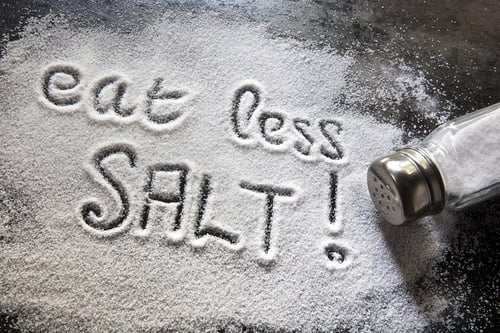Too Much Salt Should Be Avoided in a Gout Diet
Although little research has been done on the subject of salt and/or sodium in regards to gout, it is important to discuss this popular ingredient that is in almost all of our foods. What sodium does in the body is it binds water and maintains intracellular and extracellular fluids in the right balance. The truth of the matter is we humans can’t live without salt but the fact is that most fruits and vegetables have all the sodium we need in them already.
All we really need is about 500 mg of sodium daily, although the American Heart Association recommends no more than 1500 milligrams a day. Yet the average intake of sodium in North America is about 3400 mg, most of it coming from processed foods. Yes I know some of you can’t eat certain foods if they are not salted but again don’t be a glutton, add salt in moderation and make sure it is not table salt but sea salt; salt that comes from the sea.
Table salt has been heated up to 1200 degrees Fahrenheit and is refined and removed from its’ most healthy and natural elements, 84 natural minerals to be exact. Table salt found in grocery stores is mostly chemical sodium chloride, a man-made substance produced from crude oil flake leftovers, so do me the favor and only use sea salt from now on; you’re simply poisoning yourself with table salt.
I like to sprinkle some sea salt in my salad and steamed vegetables like broccoli but other than that I barely use any salt. I get most of my sodium intake naturally through fruits, vegetables and whole grains. I noticed with time if you cut out the salt in your diet, your taste buds eventually get used to it and you don’t crave it or want it.
Studies on Gout and Salt Consumption
A study published online June 18, 2012 in Circulation did indeed conclude that salt consumption including sea salt is directly linked to uric acid levels. Serum uric acid and urine albumin excretion tend to rise over time, as people get older. Albumin is a protein and should be reabsorbed in your blood and not be passed out in your urine. If your kidneys are damaged or diseased, albumin may leak into your urine.
This is one of the earliest signs of kidney damage is albumin in your urine. “Those who had a high salt intake compared with low salt intake were at a higher risk of hypertension if they had higher levels of urine albumin excretion and serum uric acid,” lead author of the study Dr. John P Forman. As the body cannot dispose of uric acid, it binds itself with the sodium chloride to form new crystals that are deposited directly in the bones and joints.
This is the cause of different kinds of rheumatism such as arthritis, gout, and kidney and gall bladder stones. Research published in the January 2002 issue of The New England Journal of Medicine states that lowering salt intake significantly reduces the recurrence of kidney stones in gout sufferers. For those who have a health issue like diabetes, hypertension, cardiovascular disease, kidney disease and kidney stones which may be related with gout too, a low sodium diet is very important not to worsen those conditions.
Processed salt may also cause you to gain weight by constipating you and causing you to retain water. Furthermore, the chemical compounds in refined table salt are designed to be addictive. The taste of table salt fools your body into believing it’s getting minerals and nutrition. When it realizes it still lacks these minerals, you crave it even more! I recommend you only consume sea salt, Himalayan sea salt or NoSalt which is a salt substitute made of potassium but tastes just like salt. If you’ve been reading my blog, you know how important potassium is to the gout sufferer in lowering uric acid levels.
Gout and the Dash Diet
A recent 2016 study from the American College of Rheumatology which appeared in Arthritis & Rheumatology found that a high-sodium based salt intake effectively lowered uric acid levels. What? The DASH diet as it is called emphasizes a diet high in whole grains, fruits, vegetables, low fat dairy, no saturated fat, no sugary beverages and low consumption of meats, like red meat, poultry etc…
Now let me ask you this? You’ve been reading this site for a while now. What do you think the real reason the subjects of this study dropped their uric acid levels? What is really the higher salt intake? Come on man! It was the other stuff, the reduction in meat intake and the increase in complex carbohydrates like vegetables, whole grains, fruits, nuts etc…So one must be careful not to be deceived. The salt here takes too much credit, in my opinion, and if you start eating more sodium/salt in your diet, you may end up with other health problems like high blood pressure, so don’t do it! There is more then enough natural salt in vegetables for example for your body’s ideal intake. You don’t really need more salt then that and unfortunately this study gives salt all the credit. Too bad… now many will be led astray.
Gout and Epsom salt
Finally, many gout sufferers have used this popular natural remedy to treat the pain and inflammation of a gout attack with Epsom salt (not to be used in food) which gets its name from a town in England called Epsom. It is distilled from a bitter saline spring and is not actually salt but rather a naturally occurring pure mineral compound of magnesium and sulphate.
Both magnesium and sulphate can be absorbed through the skin. Epsom salt has the ability to relax muscles, reduce swelling, relieve pain, fade bruises, remove toxins, softens the skin and for gout sufferers it also increases the secretion of uric acid through the skin according to those who’ve experimented with Epsom salt.
You can find Epsom salt at Costco or online. As a foot bath for the gout affected joint, add 1/2 cup of Epsom salt to a basin of warm water. Relax and soak feet for 20 minutes. You can do this once a day until the gout symptoms fade away. Some people add a cup of apple cider vinegar too.

